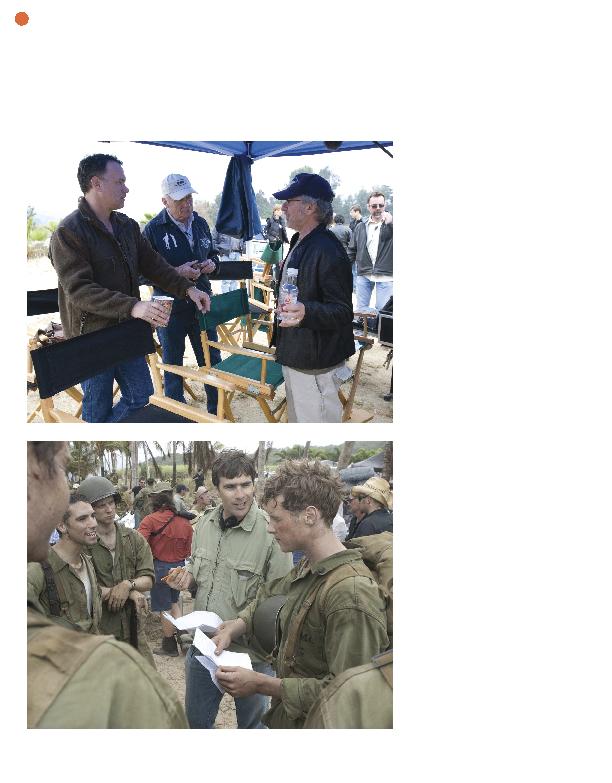
huge risk on their part, but it was worth tak-
ing for them because they knew we would do
justice to these stories."
rope is sometimes glamorized because it was
fought in cities that Americans identify
with. Yet the war waged in the Pacific was
dark, fought in places that no one knew
about and, at times, was more dangerous be-
cause of the unique psychological approach
of the enemy. "The Japanese attacked our
survival," Spielberg explains. The soldiers
had a great belief in bushido, which means
"death before dishonor." "Because our lines
were so spread out, it was very hard to fight
that kind of battle," Spielberg continues.
"The Japanese were very willing to sacrifice
themselves for bushido."
It was this internal ethical struggle that was
as interesting to the producers as the actual
battles. "The Pacific lent itself to a more
psychological examination of the moral
cost of war," McKenna says. "That was al-
ways our intent." Hanks also took interest
not just in what happened, but how these
events affected the soldiers after the battles
were over. "What we ask is, `How were they
able to go through all of this and come back
in 1946 for the first time and get on with
their lives?'" Hanks says. "I couldn't help
but wonder how they returned to normal
lives after their ordeal. How did these guys
set up a Christmas tree for their kids? How
did they pick up their lives and put on a tie
and go back to a job? It's extraordinary that
Eugene Sledge came home as he did and
lived as he did."
psyche is what makes the series so unique.
"It's about the souls of men," Spielberg says.
"It's the story of the corruption of the
human spirit and the private war that all of
those soldiers had to fight to save themselves
from what they were witnessing and what
they were engaged in." This moral duality
seen both on and off the battlefield was the
overriding reason Hanks and Spielberg de-
cided to head back into World War II, and
they trusted McKenna to deliver that to the
audience. "From the very moment I was
hired, Steven looked at me and said, `Don't
blink; don't hold anything back," McKenna
recalls. "I tried not to do that."
with how it would come together to form a
seamlessly cohesive series. At first he hoped
to interconnect his stories similar to the way
the scenes connected in Traffic, where differ-
ent characters weave into each other
throughout their own stories. But his eureka
moment for how to blend them together
came during his extensive interview process.
While interviewing Private First Class Sid
Phillips, Sledge's best friend from youth, he
discovered Phillips actually served in Robert